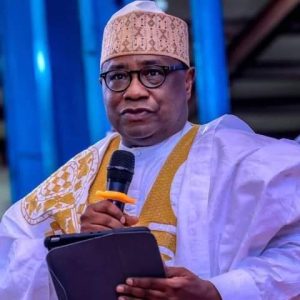
I used to be a songwriter and a lyricist. So, I am writing this from lyrical perspective. Reading the frenzy of news about reviving the old National Anthem of the country, I could not help but wonder about how today’s Wokeism might clash with the Political Correctness of the lyrics of the old anthem.
We all sang it. Old codgers, that is. Primary and Secondary Schools in the 1960s and 1970s. Innocently. Sweetly. The symphonic strings of the music instilled in me early love for orchestral music. Then they changed it in a fit of patriotism, with more ‘upbeat music’ as the newscaster (I think it was Dr Madu Mailafiya) stated in 1978 NTA when announcing it.
Me? If I were casting the national anthem in 2024, I’d probably use Rap beat! And now, they are returning to the future.
Lillian Jean Williams’s lyrics to the old 1960 ‘Nigeria We Hail Three’ national anthem, discarded and replaced in 1978 because it was composed by a foreigner (while retaining the name of the nation, ‘Nigeria’, which was also coined by a foreigner) reflected the often tangled ethnography of Nigeria’s nationhood.
The lines of the old anthem were of ye olde British grammar that describes Joseph Conrad’s Heart of Darkness. Here is a Wokeist interrogation of some of the Dark lines:
“Our own dear native land”
“Native” is not politically correct expression in anthropology. Everyone is a native of somewhere. But the ‘native’ was used often by racist anthropologists to refer to ‘savages’ So, off that goes in the 1978 wording. Or perhaps the aversion to the old national anthem was to the word ‘tribe’ instead of ‘ethnic’.
“Though tribe and tongue may differ”
“Tribe” promotes a myth of primitive African timelessness. Possibly caused by the grammatical difficulty of placing the word, “ethnicities” within the lyrical structure. “Tribe” refers to a social grouping of people with common culture and dialect.
It is a whole society with a high degree of self-sufficiency at a near subsistence level, based on a relatively simple technology without writing or literature, politically autonomous and with its own distinctive language, culture and sense of identity, tribal religion being also coterminous with tribal society.
This racist anthropology of grouping, casting such groups to the platform of European pre-industrial social culture ignores the thousands of indigenous communities who are literate in their own ways, complete with writing systems and vocabularies, and endowed with sustainable endogenous technology that ensured their survival for hundreds of years.
Roundly rejected by Africans themselves, the division of African communities into tribal units was based on European perceptions of language, religion, dress, and territory that served colonial interests; its implied distinction between “tribal” Africa and “civilized” Europe; and its association with “tribalism,” a pejorative term that connotes antagonistic tribal groups bent on destroying national unity.
The colonial administration changed the narrative of grouping – shifting focus away from endogenous groupings to a larger coalesced units in the form of an artificial ‘nation’ created by the colonial military industrial complex.
“Ethnic”, on the other hand, refers to groups, different as they are, but with common national orientation – clearly far higher than that of tribes. And yet, before the cobbling together of Nigeria in 1900 by the British, the referent to ‘tribes’ was correct.
Williams’ lyrics were structurally wrong, however, when she composed them for a collective grouping of ‘tribes’ that had just been coalesced and recognize a central government of Nigeria. Thus, within the context of the old national anthem, ‘tribe’ was wrong, while ‘ethnic’ was right.
“In brotherhood, we stand”
Sister act, anyone? Reinforcing the male dominated patriarchy of African societies, and relegating women to the background.
“Our sovereign Motherland”
I thought it was “fatherland” that determine one’s patriarchy?
“In peace or battle honour’d”
Are we still expecting battles to come in the future? Why not focus on more peace?
“Where no man is oppressed”
What about women? Why not ‘no one’?
The trailer of Star Trek TV show in the 1960s had this dilemma: “to boldly go where no man has gone before”. They became Woke and changed it to “where no one has gone before”.
The new old national anthem is an interesting example of political correctness locking horns with Wokeism in the 21s century. Interesting to see how it’d all sort itself out!
* Adamu, former Vice-Chancellor of the National Open University of Nigeria (NOUN), is a double Professor of Science Education and Media Studies at Bayero University, Kano. E-mail: auadamu@yahoo.com
